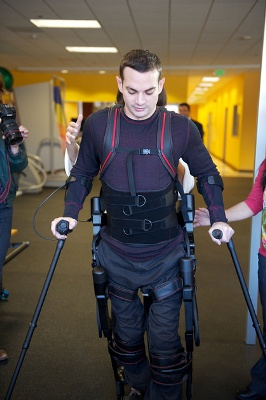Dec 21 2012
After transferring himself from a wheelchair into a robotic suit, onlookers held their breath with excitement as they watched 27-year-old Aaron Bloom grip the handles of specially designed crutches, raise to his full height, and walk at Huntington Memorial Hospital's Outpatient Rehabilitation Center on Wednesday.
 Aaron Bloom, 27, a paraplegic, wowed onlookers as he transferred from his wheelchair, donned a bionic suit and walked at Huntington Memorial Hospital's Outpatient Rehabilitation Satellite in Pasadena yesterday. (Photo: Business Wire)
Aaron Bloom, 27, a paraplegic, wowed onlookers as he transferred from his wheelchair, donned a bionic suit and walked at Huntington Memorial Hospital's Outpatient Rehabilitation Satellite in Pasadena yesterday. (Photo: Business Wire)
Bloom, who lost the use of his legs in a July 2010 accident, became one of the first Southern California residents to begin using the bionic suit designed by Ekso Bionics and now available at Huntington Hospital.
Other wheelchair-bound Southern California individuals, captivated by the prospect of using the robotic suit themselves, watched in awe as Bloom demonstrated this incredible new technology that enables people with lower-extremity paralysis or weakness to stand and walk. Huntington Hospital is the first hospital in Southern California and only the third in the western United States to offer the suit.
“It’s a powerful experience to be able to regain an ability that I have lost,” said Bloom. “I hope that other wheelchair-bound people will have the opportunity to walk across a room and once again see things from a higher vantage point.”
Patients are able to walk with the assistance of Ekso™, a ready-to-wear, battery-powered bionic suit – or exoskeleton – that is strapped over the user’s clothing. With the patient providing the balance and proper body positioning, Ekso allows patients to walk while a physical therapist uses the control pad to program the desired walking parameters, such as step length and speed, as well as control when the Ekso stands, sits and takes a step. It is powered by two high-capacity lithium batteries, which drive the hip and knee motors.
“What we are witnessing is the collective power of ingenuity, science and engineering combined with the human spirit,” said Sunil Hegde, M.D., medical director of Huntington’s Outpatient Rehabilitation Center. “The Ekso technology allows people to rethink current physical limitations and achieve the remarkable.”
Ekso can be adjusted to fit most people between 5’2” and 6’2” who weigh 220 pounds or less. The user needs arm function and adequate upper extremity strength to manage crutches or a walker. An experienced user can transfer to/from their wheelchair and put on or off the Ekso in less than five minutes. The torso and leg straps are designed to enable the user/patient to easily get in and out of the device with no or minimal assistance. The learning curve is user specific, and usually individuals begin using a walker and progress to crutches.
The addition of the Ekso technology to Huntington Hospital’s Outpatient Rehabilitation Center was made possible through the generosity of a challenge gift from donors Carol and Harry Tsao and Renata and Talmadge O’Neill. They made their donation in honor of their families’ philanthropic legacies. Tsao and Talmadge are co-founders of Mezi Media and are investors in Ekso Bionics.
So as to encourage other people to support these much-needed services, Tsao and Talmadge have agreed to match dollar for dollar other community donations to the hospital’s neuroscience program. “We are deeply grateful to these wonderful families for their support of important and life-changing care within our walls,” said Dr. Hegde.